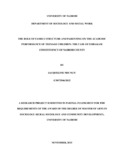| dc.description.abstract | The family is usually the major source of the basic necessities which is made possible by the prevailing socio-economic, environmental and sometimes political conditions. However, the structure of family influences the provision of the basic needs to the adolescents and hence their school attendance and concentration in class. This study sought to examine the role of family structure and parenting on the academic performance of teenage children, to establish the types of family structure, to identify the characteristics of different types of family structure, to examine the relationship between family structure and school related activities among teenagers, to establish the effect of family structure on academic performance of teenagers and to examine how family structure in relation to socio-economic status influence the academic performance of teenagers. This research study used a descriptive research design. The target population of this study was 385 3rd year students and teachers in the four public secondary schools. In addition, this study used systematic sampling method to select 20 percent of the target population. The sample size of this study was 77 respondents and 8 teachers. The study used primary data which was collected by use of questionnaires; which included structured and unstructured questions. Quantitative data was analyzed by use of descriptive and inferential statistics with the help of a data analysis software, Statistical Package for Social Sciences (SPPS). The study also used correlation analysis to establish the relationship between the dependent variable and independent variables. The study found that there is an association between socio-economic status and parenting and academic performance of students in secondary schools. Family structure influences self-esteem, class concentration, parental support, school attendance and tardiness, parent-teenager relationship among teenagers. The study also revealed that school fees payments, healthy cognitive and social development and the provision of good uniform (clothing) influence the academic performance of the teenagers significantly. The various stakeholders in the education sector need to come up with strategies to identify various backgrounds of different students in their schools. This may enable them to understand clearly the nature of each student and thus being able to handle them with ease and appropriateness so as not to hamper the educational progress. In addition, there is also need for guidance and counseling processes in the public secondary schools. The main role of these counseling sessions may be to encourage and motivate the students to see beyond their limitations and put more focus on the future through persistence and determination in their education. | en_US |

